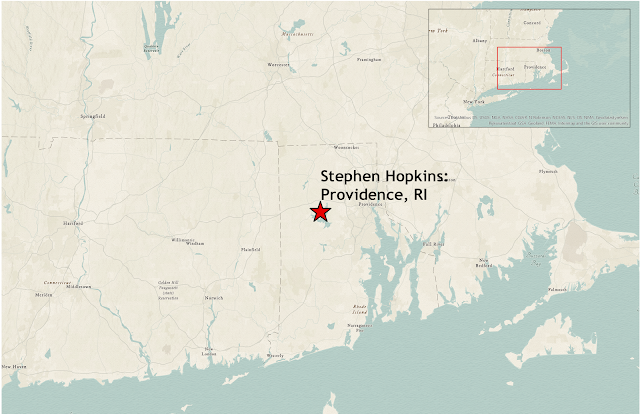Founding Fathers - Stephen Hopkins
Stephen Hopkins
Born: March 7, 1707 (Providence, RI)
Died: July 13, 1785 (Providence, RI)
For our fifteenth entry among the Founding Fathers we'll look at a patriot with the shakiest signature from the smallest state in the union - Stephen Hopkins. Born in a part of town that would later separate from Providence and instead become known as the town of Scituate, he was the second of nine children in his home and descended from a family that had been among the original settlers of Rhode Island. His parents, William and Ruth Hopkins, and other family members helped to educate young Stephen because there were no schools in the area, and he was drawn to reading at an early age while learning the skills necessary to work as a farmer and surveyor. In 1726, while still at the age of 19, he married Sarah Scott and the couple would go on to have seven children together. Five years later the township of Scituate was officially formed and he participated in public life for the first time, moderating the very first town meeting.
For the better part of the following decade, Stephen Hopkins was actively involved in civic duties as his political career began to grow. He served in such positions as justice, town council president, clerk, and legislator, while also enhancing his commercial life by opening a mercantile business alongside his brother. After helping his hometown get on its feet he moved his family into Providence in 1742 and, just as he had done in Scituate, Hopkins coupled his surveying skills and business acumen to help Providence grow and expand. Within two years he was once again elected to the Provincial Assembly, where he remained until he became the Chief Justice of the Rhode Island Superior Court in 1751 at the age of 44.
In the years following the loss of his wife of 27 years, Stephen Hopkins experienced a busy and momentous period, starting in 1754 with the start of the French and Indian War. When Rhode Island chose to send Hopkins to a meeting of colonial leaders in Albany, NY, to discuss organizing against the French, he met and befriended Benjamin Franklin. The two men strongly argued for Franklin's plan to unify the assets of the colonies, but the governors and ministers who oversaw the colonies opposed the idea and it was never implemented. In 1755 Hopkins remarried at the age of 48 to a wife named Anne Smith, although the couple had no children. That same year he was elected governor of the state of Rhode Island. As the leader of the more radical faction of the colony's political structure, Hopkins battled continually against his bitter rival from the more conservative wing, Samuel Ward, and won nine of the annual elections over the following 13 years. Relations with Britain began deteriorating towards the end of that time and Hopkins became an outspoken supporter of the rights of the colonists to govern themselves and not submit to taxes and laws forced upon them by the Crown. Somewhat ironically for a child that never had formal schooling, Hopkins soon became the first chancellor for the new College of Rhode Island in 1764, which later became Brown University. Additionally, he introduced a bill that would prohibit the slave trade in Rhode Island and freed all but one of the slaves he had owned. The last person, a woman called Fibbo, was kept only because Hopkins noted that she had children who needed the care of a mother - yet this logic was not enough to sway other Quakers who were opposed to the institution of slavery and revoked his membership in their meetings.
After using his skills as an author and political position to support the cause of liberty for a number of years, Stephen Hopkins was a logical choice to represent Rhode Island at both the first and second meetings of the Continental Congress. He fiercely advocated for a split from Britain, and although he signed the Olive Branch Petition to King George III he also famously stated that "...powder and ball will decide this question. The gun and bayonet alone will finish the contest in which we are engaged..." As the second oldest delegate to vote for independence, behind his friend Benjamin Franklin, he suffered from palsy that forced him to hold his right hand with his left as he wrote. He defiantly stated that "my hand trembles but my heart does not" as he signed the Declaration on August 2, 1776. He retired from Congress a month later and returned home to serve in Rhode Island's assembly, but did help craft the Articles of Confederation and form the new Continental Navy, where his brother Esek served as commander-in-chief. He declined several offers to return to Congress, withdrawing permanently from public life in 1780 before eventually dying at home five years later at the age of 78.
The signature of Stephen Hopkins can be found as the seventh name on the sixth (farthest right) column beneath the Declaration of Independence.




Comments
Post a Comment